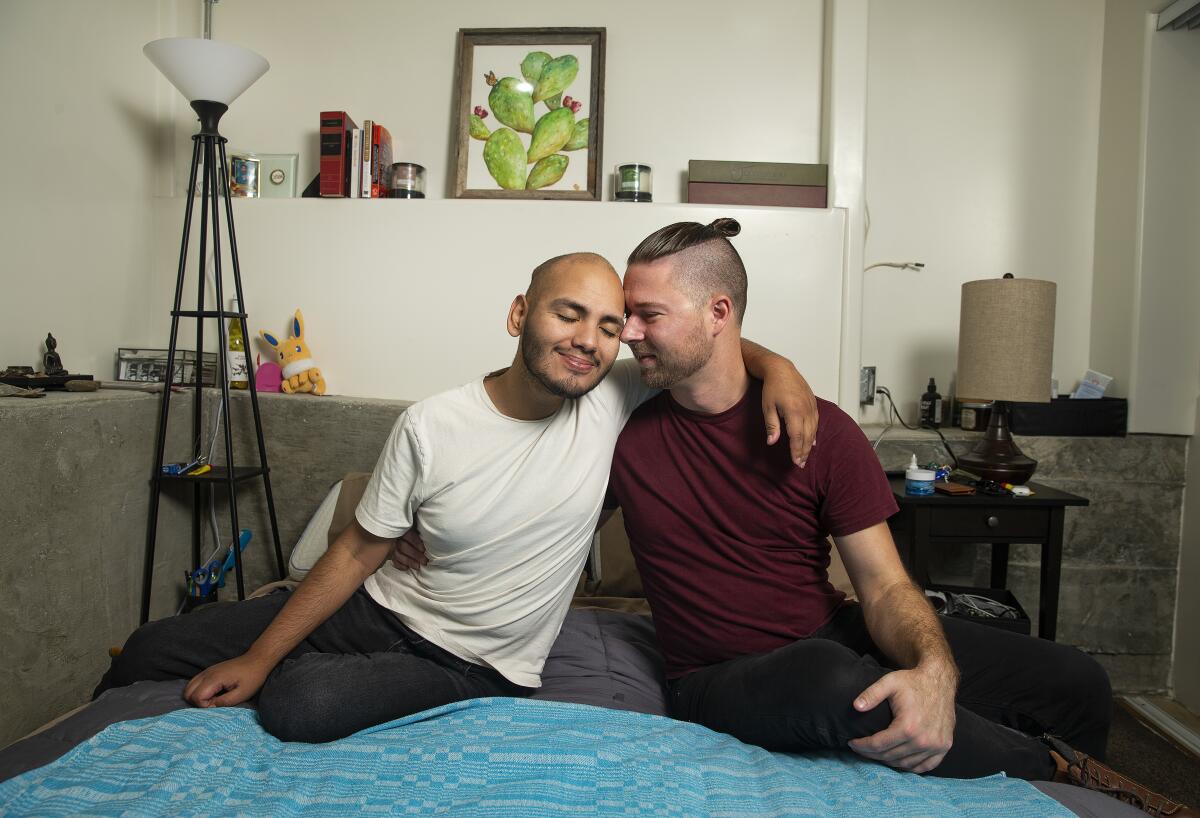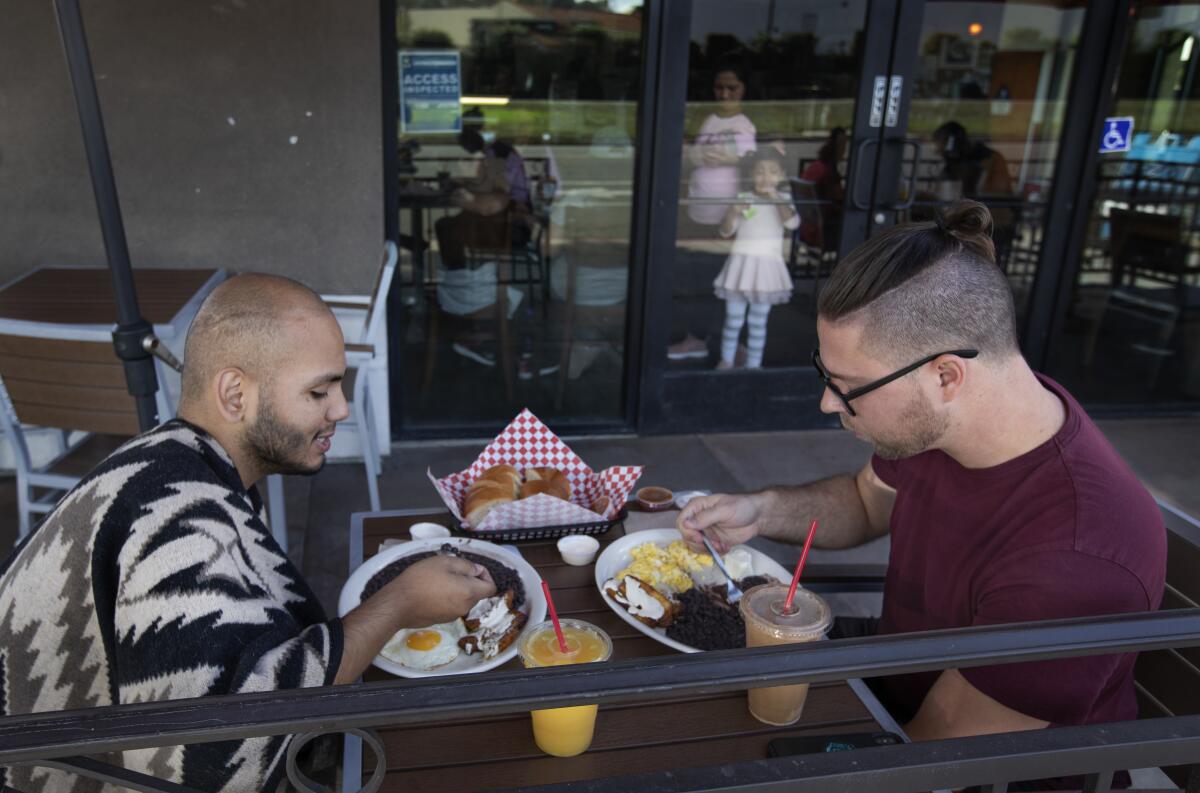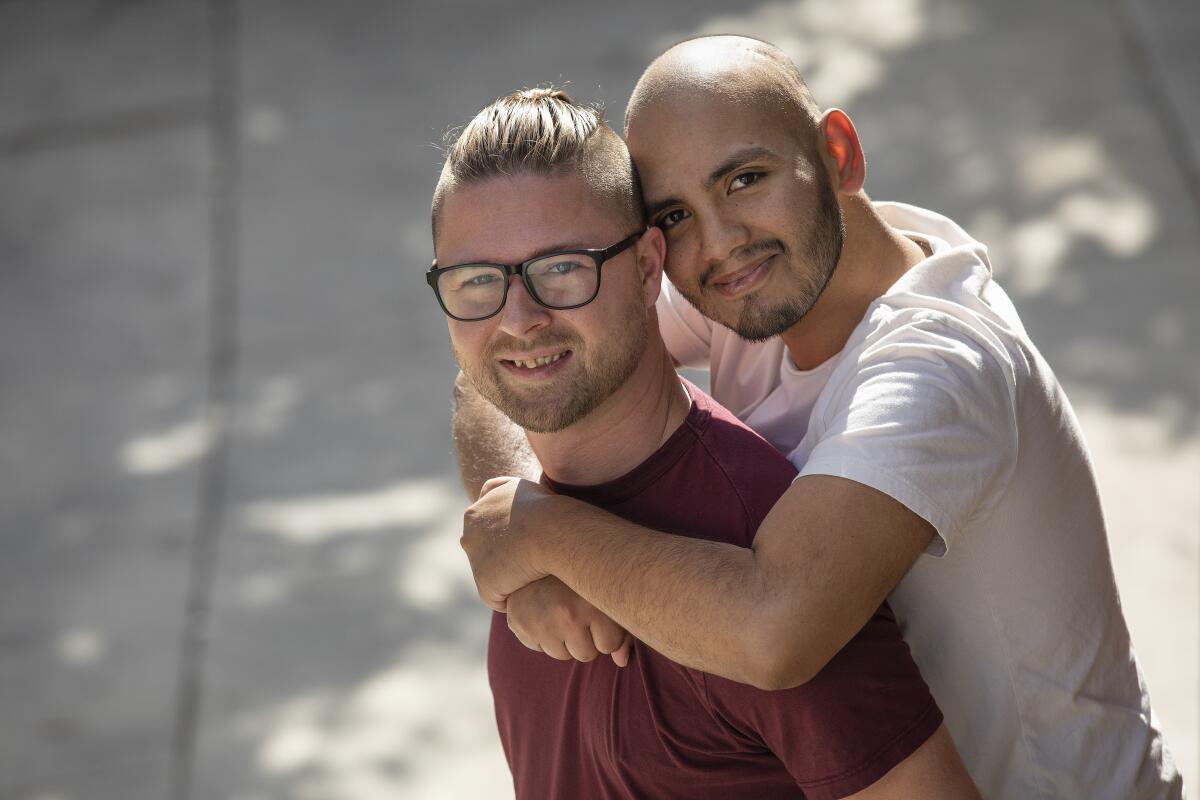Love in the time of DACA

Maria Lopez spotted him at a bachata class. He checked off all her boxes. Superb dancer. Smart — he had an engineering degree. Tall, dark and handsome.
After a month of dating, he revealed he was in the country illegally. She too lacked legal status, though she had the relative protection of being in the Obama-era Deferred Action for Childhood Arrivals program.
Wordlessly, they pumped the brakes on their relationship.
Being without legal status under the umbrella of DACA has always been a risky proposition. Deportation always lurked in the background.
But now that the program is under threat from an unfriendly White House — and currently at the mercy of a conservative-leaning U.S. Supreme Court — life for its beneficiaries has become cloudier.
In May, Lopez, a 25-year-old San Jose resident, launched an Instagram account called YTienePapeles? (AndDoesHeHavePapers?)
The page is her attempt “to heal through humor,” she said. Sometimes she’ll create memes about crushing on people without legal status. One post pictured a crying toddler next to text that read: “When you find out your crush no tiene papeles.” Other times she’ll post syrupy sayings: “Unlike DACA, my love for you is permanent.”
The memes are relatable, Lopez said. “If you are undocumented and in the dating scene, you will definitely encounter this.”
Relationships can provide a sense of security and comfort, but the uncertainty of DACA’s future can leave so-called Dreamers feeling just a bit more unsettled about the pursuit of them, said Harvard sociologist Roberto Gonzales.
“In our research, we’ve seen DACA beneficiaries victimized by partners who use their fragile status and their families’ status against them,” Gonzales said.
“Lives in Limbo: Undocumented and Coming of Age in America,” Gonzales’ book based on a 12-year project following 150 young people around the L.A. area, found that immigrants often felt their legal status could drive wedges into relationships.
Lopez, for example, had begun dating one young man in 2011 — a year before she joined the DACA program. He was the son of immigrants, Lopez said, who had legalized their status in the U.S.
After six years, around the time that President Trump announced his intention to wind down DACA, their relationship soured. Lopez said she did not expect to get married right away, but wanted to know if it was in the couple’s future. When she pressed her boyfriend, Lopez said, he asked: “Is citizenship the reason you want to be with me?”
And that was that.
Said Andrea Simon-Martinez, a 26-year-old DACA recipient who lives in New York: “Telling someone you’re undocumented, it’s like peeling off a Band-Aid, you want to do it sooner rather than later.”
Simon-Martinez was born in Mexico and was 6 years old when she overstayed her tourist visa. She said dating and looking for a serious partner takes a toll. In February 2018, she wrote a post about the anxiety of dating while “DACA-mented.”
“I never know when to bring it up in conversations, and then it makes me feel like I’m leading them on,” she wrote. “It makes me feel like I’m being deceitful and keeping a big part of me hidden away.”
Juan Pacheco Marcial, a 23-year-old DACA recipient who attends Cal State Monterey Bay, said his legal status keeps him from dating seriously. He makes sure not to get too attached because of a feeling in his gut that, one day, he will be deported. And he won’t date another DACA recipient or person without legal status.
“When I date someone, I don’t see a future with them because I don’t even see a future for myself,” he said. “Of ... having a happy ending here in the United States.”
Marcial said he does not want children because of the cloud over his presence in the country. He said it’s the reason he broke up with a girlfriend who was a citizen.
“I feel that I wouldn’t be able to live with myself if I were to have a child and I were, for some reason, to get kicked out of this country and not be able to come back,” he said.

A year ago, Jose Guevara, 25, and Stephen Johnson, 29, got married.
Guevara is a DACA recipient who was brought to the U.S. from El Salvador at age 10. Johnson was born and raised in a conservative Baptist family in North Carolina.

They met online two years ago. Guevara said he was upfront from the start — laying out his “baggage.”
“I have cancer and I’m a DACA recipient,” he revealed.
Johnson, whose work involves community organizing, said it didn’t bother him. After a couple of months of dating, Guevara was hospitalized and underwent treatment for leukemia — which he’s battled off and on since he was 15.
The possible end of DACA worried the couple. Guevara feared returning to El Salvador, partly because homophobia is prevalent there. But he felt he was becoming a burden to Johnson, who wanted to marry.
“It’s a lot of labor to love someone who is a DACA recipient,” Guevara said. “We are at the will of the government.”
But Johnson was determined.
“We’ve been through a really hard thing that most couples have not gone through at our age and made it out successfully,” Johnson said. “If we can make it through that, we can make it through anything.”
They are now legally the Guevara-Johnsons.
In San Francisco, Tony K. Choi said he would like to be able to love and date on his own terms.
A DACA recipient who is a creative writer for Democratic presidential candidate Tom Steyer, Choi said his legal status is always part of the life calculations he makes.
“Marriage and immigration status are intrinsically linked to my romantic life,” the 31-year-old said.
Choi, who came to the U.S. from South Korea on a tourist visa at age 9, realizes marriage to a U.S. citizen is probably his best option for staying in the country, but he’s “incredibly millennial” and not looking to wed anytime soon.
Still, he said, he avoids dating DACA recipients or men who are in the country illegally. He had a crush on a man without legal status, but he willed himself to make a cold calculation.
“What is there to gain from this relationship?” Choi said.
Some DACA recipients said they’ve received marriage proposals from close friends who want to help. Others feel pressure from parents, other family members or older immigrants who repeatedly tell them to fall in love and marry someone who has legal status.
Lopez still remembers how, when she was 6, her grandmother sat her down and told her: “You have to marry someone with papers.”
“At 6, you don’t even know what that means,” Lopez said.
A few weeks ago, she posted a meme on Instagram with a picture of a distraught and teary-eyed SpongeBob SquarePants surrounded with bursting red hearts. The text read: “When you gotta end [it] with your favorite undocu-novio.”
More to Read
Sign up for Essential California
The most important California stories and recommendations in your inbox every morning.
You may occasionally receive promotional content from the Los Angeles Times.











